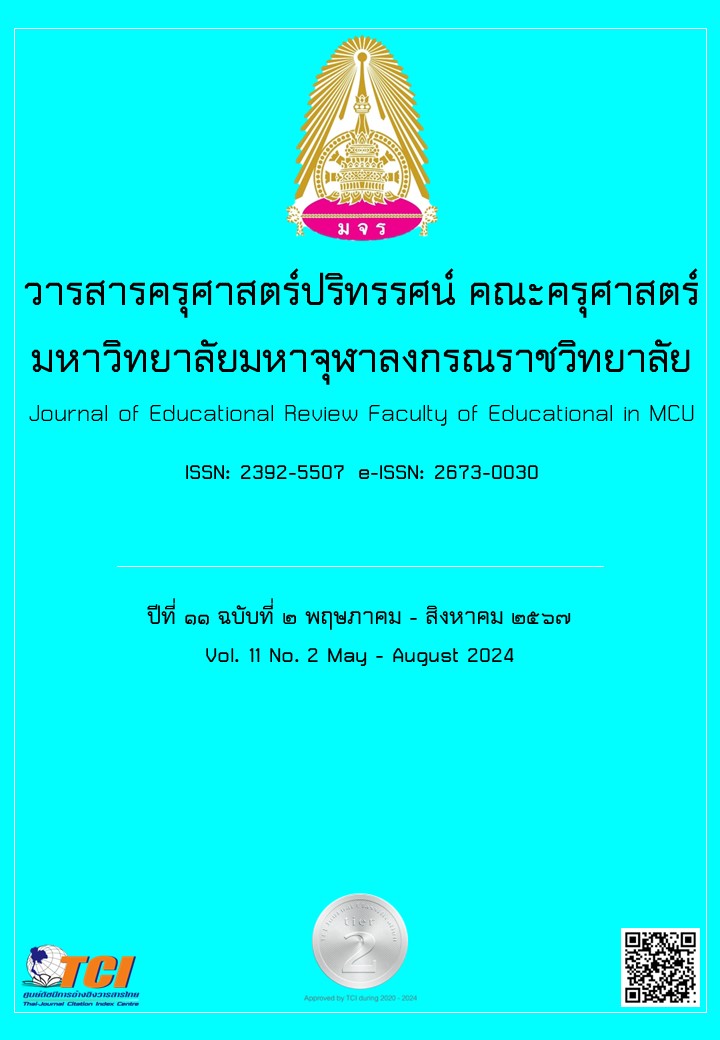THE GUIDELINES FOR PARTICIPATORY ACADEMIC ADMINISTRATOR BASED-ON APARIHANIYADHAMMA 7 OF PRIMARY SCHOOL SMAIL SIZE SCHOOL UNDER NAKHON SAWAN PRIMARY SCHOOL EDUCATION SERVICE AREA 1
Main Article Content
Abstract
This research article aimed 1) to study the state of participatory academic administration of small school administrators and 2) to create a guideline for participatory academic administration of administrators based on the 7 principles of Aparihniyadhamma in small schools. A mixed-method research was used. The quantitative research collected data from 286 samples. The research instrument was a questionnaire with a reliability of 0.94. Data were analyzed by finding frequency, percentage, mean, and standard deviation. The qualitative research used a semi-structured interview method by collecting data from 9 key informants and analyzing the data by content analysis. The research results showed that 1) the state of participatory academic administration of small school administrators was at a high level overall and 2) the guideline for participatory academic administration of administrators based on the 7 principles of Aparihniyadhamma in small schools was as following: (1) Curriculum administration: administrators should organize a system for formulating the school curriculum that allowed all parties to participate in the development. (2) Teaching and learning management: administrators should organize a system for developing the learning process continuously, allowing learners to interact socially with individuals and various sources of knowledge. (3) Development of innovative media and educational technology. Administrators promoted teachers to produce and develop teaching media and innovations, and cooperate with government and private agencies to promote development. (4) Measurement and evaluation: Administrators supervise and monitor measurement and evaluation, academic administration, and were open and straightforward. Administrators should organize workshops to create and develop tools and conduct evaluations that covered all learning subject groups. (5) Supervision within the educational institution: Administrators planed for all parties to participate in recognizing the criteria and practices to support educational supervision. (6) Development of an internal quality assurance system in the educational institution: Administrators set additional educational standards of the educational institution to be consistent with national educational standards, basic education standards, and standards of the Office of the Basic Education Commission.
Article Details

This work is licensed under a Creative Commons Attribution-NonCommercial-NoDerivatives 4.0 International License.
ทัศนะและความคิดเห็นที่ปรากฏในบทความในวารสารฉบับนี้ถือเป็นความรับผิดชอบของผู้เขียนบทความนั้นเพียงผู้เดียว และไม่ถือเป็นทัศนะและความรับผิดชอบของกองบรรณาธิการ
กองบรรณาธิการขอสงวนสิทธิ์ในการคัดเลือกบทความลงตีพิมพ์และจะแจ้งให้เจ้าของบทความทราบหลังจากผู้ประเมินบทความตรวจอ่านบทความแล้ว
ต้นฉบับที่ได้รับการตีพิมพ์ในวารสารครุศาสตร์ปริทรรศน์ คณะครุศาสตร์ มหาวิทยาลัยมหาจุฬาลงกรณราชวิทยาลัย ถือเป็นกรรมสิทธิ์ของคณะครุศาสตร์ มหาวิทยาลัยมหาจุฬาลงกรณราชวิทยาลัย ห้ามนำข้อความทั้งหมดหรือบางส่วนไปพิมพ์ซ้ำ เว้นเสียแต่ว่าจะได้รับอนุญาตจากมหาวิทยาลัยฯ เป็นลายลักษณ์อักษร
References
กระทรวงศึกษาธิการ. (2545). พระราชบัญญัติการศึกษาแห่งชาติ พ.ศ. 2542 แก้ไขเพิ่มเติม (ฉบับที่ 2) พ.ศ. 2545. กรุงเทพมหานคร: กระทรวงศึกษาธิการ.
กระทรวงศึกษาธิการ. (2547). คู่มือการบริหารสถานศึกษาที่เป็นนิติบุคคล. กรุงเทพมหานคร: กระทรวงศึกษาธิการ.
กระทรวงศึกษาธิการ. (2556). นโยบายการศึกษา. กรุงเทพมหานคร: สำนักนโยบายและแผนการศึกษาขั้นพื้นฐาน.
กิติมา ปรีดีดิลก. (2542). การบริหารและการนิเทศการศึกษาเบื้องต้น. กรุงเทพมหานคร: อักษรพิพัฒน์.
ชัยรัตน์ ลำฤทธิ์. (2550). สภาพและปัญหาการบริหารงานวิชาการของสถานศึกษาในเครือบดินทรเดชา. วิทยานิพนธ์ศึกษาศาสตรมหาบัณฑิต. มหาวิทยาลัยศรีปทุม.
ทัศนีย์ วงศ์ยืน. (2543). การบริหารงานวิชาการ. กรุงเทพมหานคร: คณะบริหารการศึกษาจุฬาลงกรณ์มหาวิทยาลัย.
ธร สุนทรายุทธ. (2551). การบริหารจัดการเชิงปฏิรูป. กรุงเทพมหานคร: เนติกุลการพิมพ์.
ปรียาพร วงศ์อนุตรโรจน์. (2553). การบริหารงานวิชาการ. กรุงเทพมหานคร : ศูนย์สื่อเสริม.
พระครูวิลาศกาญจนธรรม (เล็ก สุธมฺมปญฺโญ). (2555). การปกครองคณะสงฆ์ตามหลักภิกขุอปริหานิยธรรมของคณะสงฆ์อำเภอทองผาภูมิจังหวัดกาญจนบุรี. วิทยานิพนธ์พุทธศาสตรมหาบัณฑิต. มหาวิทยาลัยมหาจุฬาลงกรณราชวิทยาลัย
พระพรหมคุณาภรณ์ (ป. อ. ปยุตฺโต). (2550). ธรรมนูญชีวิต. กรุงเทพมหานคร: สำนักพิมพ์จันทร์เพ็ญ.
มหาจุฬาลงกรณราชวิทยาลัย. (2539). พระไตรปิฎกภาษาไทย ฉบับมหาจุฬาลงกรณราชวิทยาลัย. กรุงเทพมหานคร: มหาจุฬาลงกรณราชวิทยาลัย.
รุ่ง แก้วแดง. (2541). ปฏิวัติการศึกษาไทย. พิมพ์ครั้งที่ 2. กรุงเทพมหานคร: มติชน.
สมพร พรมชินวงศ์. (2550). การศึกษาการบริหารงานวิชาการในสถานศึกษาขั้นพื้นฐาน สังกัดสำนักงานเขตพื้นที่การศึกษาชัยภูมิ เขต 3. วิทยานิพนธ์ครุศาสตรมหาบัณฑิต. มหาวิทยาลัยราชภัฏชัยภูมิ.
สุริยันต์ อินทเจริญศานต์. (2552). การบริหารวิชาการของโรงเรียนขยายโอกาสทางการศึกษาสังกัดสํานักงานเขตพื้นที่การศึกษาพะเยา เขต 2. วิทยานิพนธ์ครุศาสตรมหาบัณฑิต. มหาวิทยาลัยราชภัฏเชียงราย.
สุวิมล ติรกานันท์. (2551). การสร้างเครื่องมือวัดตัวแปรในการวิจัยทางสังคมศาสตร์ แนวทางสู่การปฏิบัติ. กรุงเทพมหานคร: โรงพิมพ์แห่งจุฬาลงกรณ์มหาวิทยาลัย.
สุวิมล เปลื้องกระโทก. (2546). การมีส่วนร่วมในการบริหารงานวิชาการของครูโรงเรียนประถมศึกษา สังกัดสำนักงานการประถมศึกษา จังหวัดพระนครศรีอยุธยา. วิทยานิพนธ์ครุศาสตรมหาบัณฑิต. สถาบันราชภัฏเพชรบุรีวิทยาลงกรณ์.
อุทัย บุญประเสริฐ. (2538). การวางแผนการศึกษา. กรุงเทพมหานคร: โรงพิมพ์จุฬาลงกรณ์มหาวิทยาลัย.
Keeves, Peter J. (1988). Model and Model Building: Educational Research Methodology and Measurenment : An Intermational Handbook. Oxford: Pergamon Press.
Krejcie, R. V. & Morgan, D. W. (1970). Determining sample size for research activities. Educational and Psychological Measurement. 30(3). 607–610.
Van Miller. (1965). The Public Administration of American School. New York: Macmillan Publishing Company.


